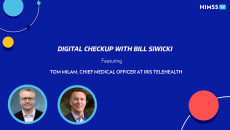Patient Access
The consortium's collaboration and partnership opportunities may be the most beneficial to the HIMSS audience, according to James Hury, the Translational Research Institute for Space Health's chief innovation officer.
United Language Group's Leslie Iburg and Abigail Katz discuss the expiration of the federal public health emergency and what is needed to reach beneficiaries, including creating culturally relevant materials in multiple languages.
Community Health Network EVP and Chief Transformation Officer Dr. Patrick McGill discusses creating seamless and frictionless care delivery and 360-degree understanding of what it's like from a patient, caregiver or clinical outcome perspective.
To reach the goal of universal healthcare by 2030, Kirsten Mathieson, policy lead at Transform Health, points to the central recommendations from the report "Closing the digital divide: More and better funding for the digital transformation of health."
Hospitals are filling the need for psychiatrists and behavioral health services with virtual care, as Dr. Tom Milam, chief medical officer at Iris Telehealth, explains.
Tribal communities' health is impeded by dual problems: insufficient government funds and a lack of interoperability, which cause a deficiency of healthcare IT solutions, says Tyler LaPlaunt, assistant director at Upper Peninsula Health Care Solutions.
When is a virtual nurse needed? What are the skills required? What outcomes are hospitals seeing? Lisbeth Votruba, RN, chief clinical officer at AvaSure, explains.
An app that assists clinicians in communicating with patients also promotes equity, according to Rachael Grimaldi, cofounder and CEO of CardMedic.
Brave Health, a virtual behavioral healthcare provider, has big plans for its new $40 million Series C raise, according to CEO and cofounder Anna Lindow.
Mindstrong's chief clinical officer Dr. Holly Dubois discusses the work of the digital mental health company. She focuses on the role of virtual care and on a special program created to prevent suicide among veterans.









